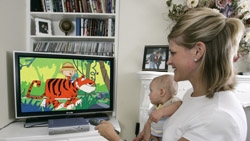USDTV gains traction

For $19.95 a month, subscribers get a package of 20 to 30 channels, depending on where they live.
In the six months it has been in business, over-the-air pay TV service U.S. Digital Television (USDTV) has gained more than 8000 subscribers, and the experience to make it work. The challenge going forward is to grow beyond their current beta test markets.
USDTV is the first terrestrial digital subscription TV service in the United States to piggyback the new digital broadcast channels of local television stations. Participating stations, which lease unused spectrum to USDTV, have begun receiving revenue, according to company executives, and technically it has worked with few interruptions.
The service is now available in Albuquerque, NM, Salt Lake City, UT, and Las Vegas. The company plans to be in 30 markets by the end of the year and eventually be in every major market in America.
With significant competition from cable and satellite, this growth may not be as easy as the company would like. The biggest hurdle might be convincing broadcasters to lease their spectrum. While a list of broadcast companies (which has not been made public) have expressed interest in joining USDTV, at least one company on that list, LIN Television, is proceeding with caution. LIN operates 23 television stations - including two under local marketing agreements, two low-power networks, and has investments in five others stations - located in the Midwest and East Coast.
For $19.95 a month, subscribers get a package of 20 to 30 channels, depending on where they live. The offerings range from ESPN, Discovery Channel and the Food Network to the major broadcast networks, broadcast in standard- and high-definition (1080i) resolutions.
To get the service, customers must hook up an indoor or outdoor TV antenna and a $99 USDTV set-top box that is sold by Wal-Mart Stores and other retailers. With this gear, viewers can capture USDTV’s SD and HD programs, which are carried on unused digital spectrum that is pooled from several broadcast stations in a particular market.
The professional video industry's #1 source for news, trends and product and tech information. Sign up below.
USDTV needs about 39 Mb/s of spectrum, leased from four to five stations per market, to maintain the service. To participate, stations contribute 6-, 9- or 15 Mb/s, on average, then install several Windows Media 9 compression boards, some multiplexing cards and a satellite dish to receive USDTV’s encrypted signal.
To get the service, customers must hook up an indoor or outdoor TV antenna and a $99 USDTV set-top box that is sold by Wal-Mart Stores and other retailers.
While signal interference and poor RF reception has plagued some subscribers on the fringes of the stations’ coverage area, for the most part the service has worked to everyone’s expectations. USDTV recently announced a technology partnership with LG Electronics and LG Innotek to supply fifth-generation 8-VSB chips and ATSC tuners for use in USDTV’s set-top boxes. They’ll begin to include the LG components in set-top-boxes planned for shipments beginning in Q4 of 2004.
Bringing low-cost digital reception and interactivity to analog TV sets has always been a vision of Steve Lindsley, a former president of Bonneville's KSL-TV in Salt Lake City, UT, and now USDTV's chairman and chief executive officer.
His first attempt came in 2001, when he launched a service called Wow Digital TV during the Winter Olympic Games. Using digital television spectrum provided by local stations in Salt Lake City, a proprietary set-top box and a telephone line, participating homes were able to receive digital broadcasts of the Games on their analog TVs, call up data and make purchases. The service eventually went out of business.
The FCC has stipulated that stations must pay five percent of any revenue generated from leasing or selling its spectrum. It’s up to the individual stations to make these payments, not USDTV.
USDTV is headquartered in Salt Lake City.
